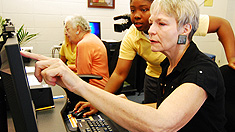INITIATVE DESCRIPTION
The Knight Community Information Challenge (KCIC) is a five-year, $24 million initiative to encourage community and place-based foundations to play leading roles in addressing the local information needs of their communities.
ASSESSMENT PURPOSE & APPROACH
Key Questions
· To what extent have community and place-based foundations become increasingly aware of and involved in addressing information needs in their communities?
· To what extent have the individual projects supported through the matching-grant Knight Community Information Challenge created more informed and engaged communities?
Approach: The evaluation findings draw on information from online surveys, website analytics and stakeholder interviews of community and place-based foundations leaders, Knight Community Information Challenge applicants, grantee institutional partners, community members and Knight Foundation staff.
Assessment Partner: FSG
PROJECT FINDINGS
REPORTS FROM THE FIELD 2011
• Field Momentum – Two-thirds of grantees funded in 2008 and 2009 report their boards increased support for community information needs. Findings show 57% of grantees funded information projects beyond their original Knight Community Information Challenge grant, totaling $14.8m in 2010. However, nearly half of the grantees about to transition to post-Knight matching funding felt uncertain about their future financial contributions to information projects.
• Perceived Effectiveness of Knight Activities – the majority of grantees report that Knight funding has been “very influential” in their foundation’s decision to address information needs. The Media Learning Seminar hosted by Knight is viewed as a major catalyst for foundation interest and engagement in addressing information.
• Project Outcomes and Reach – many grantees are still in the early stages of their project; over a third of Round 1 and Round 2 grantees have projects that are in their first year of launch. Some grantees have demonstrated evidence of increased civic engagement, promoted greater local media coverage and helped catalyze public policy shifts through their efforts.
REPORTS FROM THE FIELD 2010
· Local Foundation Involvement: Community and place-based foundations are committing significant financial resources to address information needs beyond the Knight Community Information Challenge and are building their capacity to manage these projects.
· Unique Leadership Role: Through their work in information and media, community and place-based foundations are forging out a unique leadership role for their foundation.
· Leveraging Partners: Foundations are attracting considerable outside support from funders and sponsors, and are aligning the necessary partnerships and expertise to address their own capacity gaps to support information and media projects.
The report contains a quick, five-step process for a foundation to address information needs in their own community:
1. Map the information ecosystem to determine the community information needs.
2. Identify ways the foundation can address community information needs through its ongoing work.
3. Use the foundation’s role as a community leader to improve the information ecosystem.
4. Determine what outside resources are available that could be used to address community information needs.
5. Review models emerging from the Knight Community Information Challenge and identify projects that could be replicated.
